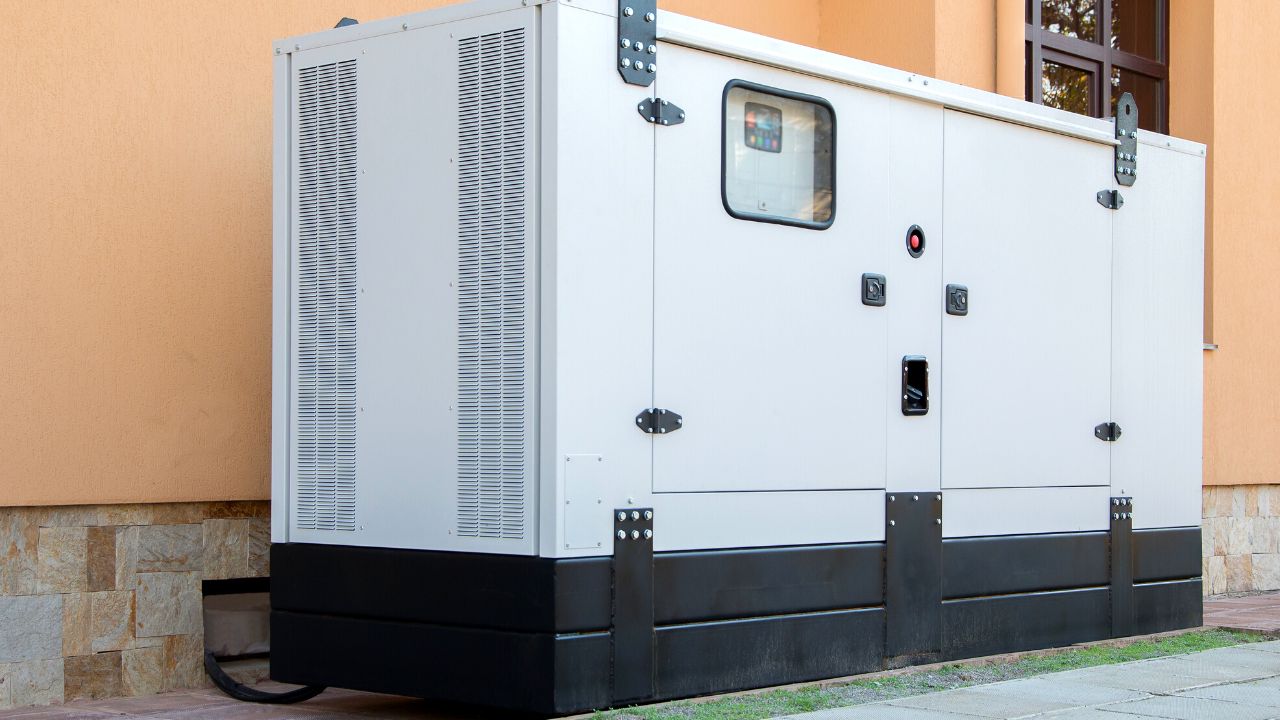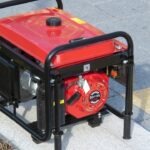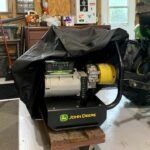If you want to make your generator quieter, there are a few things you can do. First, make sure that the generator is properly maintained and serviced. A well-maintained generator will run more smoothly and quietly than one that isn’t.
Second, choose a generator that’s designed for quiet operation. Some generators have special features like sound-dampening enclosures or mufflers that help reduce noise. Finally, consider where you place the generator.
Putting it in a shed or other enclosed space will help muffle the sound.
- Purchase a soundproofing enclosure for your generator
- These are typically made out of thick, durable materials that will help to muffle the noise coming from the engine
- Install the soundproofing enclosure around your generator, making sure that it is properly sealed so that no noise can escape
- If possible, place the generator on a soft surface such as grass or sand to further reduce the amount of noise that it produces
- Start up the generator and let it run for a few minutes to ensure that it is working properly inside the soundproofing enclosure
How to Make Generator Quieter?
Can You Make a Generator Silent?
Yes, you can make a generator silent. There are a few ways to do this, but the most common is to use an acoustic enclosure. This is basically a box that surrounds the generator and muffles the noise it produces.
Another way to reduce the noise from a generator is to use something called sound-dampening material. This is placed around the engine and helps to absorb some of the noise.
How Do You Dampen a Generator Vibration?
If you are looking to dampen a generator vibration, there are a few things that you can do. First, you want to make sure that the generator is properly installed. This means that it should be level and on a firm foundation.
If the generator is not properly installed, it will likely vibrate more.
Next, you want to check the engine mounts. These should be checked for wear and tear regularly anyway, but it is especially important if you are trying to dampen vibrations.
If the engine mounts are worn out, they will not be able to effectively hold the engine in place, causing more vibration.
Finally, you can try adding weight to the generator. This will help to keep it from moving around as much and potentially reduce vibrations.
You want to be careful with this though, as too much weight can damage the generator or cause other problems.
Why is My Generator So Loud?
If you’re the owner of a portable generator, you’re probably well aware of how loud they can be. But why are generators so loud? In this blog post, we’ll take a look at the reasons behind generator noise and some tips on how to reduce it.
There are two main reasons why generators are so loud: engine noise and exhaust noise. The engine is responsible for converting fuel into energy, and this process can be quite noisy. Additionally, the exhaust system releases harmful gases and particles into the air, which also contributes to overall noise levels.
Fortunately, there are some things you can do to reduce generator noise. First, make sure that your generator is properly installed and secured. This will help to minimize vibrations that can cause noise.
Additionally, consider installing a muffler or sound-dampening enclosure around your generator to further reduce noise levels. Finally, don’t forget to regularly maintain your generator according to manufacturer guidelines – this will help keep it running smoothly and quietly for years to come!
Generator Muffler Silencer Kit
If you’re looking for a way to reduce the noise of your generator, a muffler or silencer kit may be the answer. There are a number of different types and styles of these kits available, so it’s important to do some research to find the one that will work best for your needs.
A generator muffler is designed to attach to the exhaust pipe of your generator and redirects exhaust gases away from the engine, which reduces noise.
Some mufflers also have baffles that further reduce noise. Muffler kits usually include all necessary hardware and instructions for installation.
A generator silencer is similar to a muffler in that it attaches to the exhaust pipe and redirects gases away from the engine.
However, a silencer also has an internal chamber that absorbs sound waves, further reducing noise. Silencer kits also include all necessary hardware and instructions for installation.
When choosing a muffler or silencer kit, it’s important to consider the type of generator you have as well as how much power it produces.
Some models are designed for specific generators while others can be used with any model. It’s also important to read reviews before making your purchase to ensure you’re getting a quality product that will meet your needs.
Super Quiet Generator Muffler
If you are in the market for a super quiet generator, then you have come to the right place. In this blog post, we will provide detailed information about the best muffler for your generator that will make it run much quieter.
We all know how noisy generators can be, and if you are using yours for camping or tailgating, then the last thing you want is to disturb your neighbors or fellow campers.
That is where a good muffler comes in handy. By installing a quality muffler on your generator, you can significantly reduce the noise level, making it much more pleasant for everyone involved.
There are a few things to look for when choosing a muffler for your generator.
First of all, you want to make sure that it is specifically designed for use with generators. There are many different types of mufflers on the market, but not all of them will work effectively with generators. Secondly, you want to choose a muffler that is made from high-quality materials.
This will ensure that it lasts long and does not rust or fall apart over time. Finally, you want to find a muffler that fits your specific generator model snugly so that there are no gaps or leaks.
Installing a new muffler on your generator is relatively easy and can be done in just a few minutes with basic tools.
Once installed, simply start up your generator and enjoy the peace and quiet!
Homemade Generator Exhaust Silencer
If you’re like most people, you probably don’t give much thought to the noise your generator makes as it hums away, providing power for your home or business. But if you live in an area where sound carries, or if you just want to be a good neighbor, you may be looking for ways to reduce the amount of noise your generator produces.
One way to do this is to install a homemade generator exhaust silencer.
There are a number of designs available online, and with a little elbow grease, you can build one yourself for a fraction of the cost of buying a commercial unit.
A typical design consists of two chambers: an expansion chamber and a perforated baffle chamber. The expansion chamber is designed to slow down and cool the exhaust gases before they enter the baffle chamber.
The perforated baffle chamber contains material that absorbs sound waves, further reducing the noise level.
There are a few things to keep in mind when building a generator exhaust silencer:
1) Make sure the silencer is installed as close to the engine as possible so that hot exhaust gases don’t have time to cool down and expand before entering the silencer.
This will minimize performance loss.
How to Make Your Generator Quiet As a Cricket
Are you looking for ways to make your generator quieter? If so, you’re in luck! There are a few things you can do to help muffle the noise coming from your generator.
One option is to purchase a sound-dampening enclosure. These enclosures are designed to fit around your generator and help reduce the amount of noise that escapes. You can find these enclosures at most hardware stores or online retailers.
Another way to reduce the noise from your generator is to use flexible exhaust tubing. This type of tubing helps redirect the exhaust away from the main body of the generator, which reduces the overall noise level. You can find this tubing at most hardware stores or online retailers as well.
Finally, you can also add acoustic insulation material to your generator’s engine compartment. This will help further reduce the amount of noise that escapes from the engine area. Acoustic insulation material can be found at most hardware stores or online retailers specializing in audio equipment.
By following these tips, you can help make your generator much quieter and more enjoyable to use.
Generator Muffler Silencer
If you have a generator, chances are you need a muffler or silencer. But what’s the difference between the two? A muffler is designed to reduce noise, while a generator silencer does both – it reduces noise and exhaust fumes.
So, which one should you choose for your generator?
Here’s a quick rundown of the differences between generator mufflers and silencers:
Mufflers:
Reduce noise by deflecting exhaust gases away from the engine
Can be used with any type of engine
Are less expensive than silencers
May require periodic maintenance
Generator Noise Reduction Box
If you have a generator, chances are you’ve also experienced the loud noise it makes. While generators are essential for many people, the noise they produce can be a nuisance. A generator noise reduction box is a simple and effective way to reduce the amount of noise your generator makes.
These boxes work by enclosing the generator and absorbing the sound it produces. Generator noise reduction boxes are available in a variety of sizes, so you can choose one that’s appropriate for your needs. If you’re not sure which size to get, it’s always best to err on the side of caution and go with a larger box.
Installing a generator noise reduction box is relatively easy. Most boxes come with all the necessary hardware and instructions. In most cases, all you’ll need is a screwdriver and some basic tools.
Once the box is installed, simply run your generator as usual and enjoy the peace and quiet!
Sound Deflector for Generator
If you have a generator, you know how important it is to keep the noise level down. One way to do this is to use a sound deflector. A sound deflector is a simple device that helps to reduce the noise that your generator makes.
It works by redirecting the sound waves away from you and your property.
There are many different types of sound deflectors on the market, so it is important to choose one that will work best for your needs. If you have a small generator, there are some very affordable options available.
For larger generators, there are also more expensive options that will provide better noise reduction.
When choosing a sound deflector, it is important to consider the size of your generator and the amount of noise it makes. You also want to make sure that the deflector you choose will not impede air flow or cause any other problems with your generator.
Once you have considered all of these factors, you can narrow down your choices and find the perfect sound deflector for your needs!
How to Make a Generator Quiet for Camping
If you’re like most people, you probably don’t want to deal with a noisy generator while you’re trying to enjoy the great outdoors. Fortunately, there are a few things you can do to make your generator much quieter while camping.
First, if your generator has an exhaust muffler, make sure it’s in good working condition and properly installed.
A damaged or improperly installed muffler can cause your generator to be significantly louder.
Second, try placing your generator on a piece of foam or other soft material. This will help deaden the sound of the engine and make it much less noticeable.
Third, consider investing in a sound-dampening enclosure for your generator. These enclosures are designed to reduce the noise output of your generator by up to 25 decibels, which can make a big difference when you’re trying to enjoy some peace and quiet in the woods.
Finally, keep in mind that running your generator at half-power will usually result in less noise than running it at full power.
So if you don’t need all the power that your generator is capable of producing, dial it back and enjoy a little more silence.
Conclusion
If you have a generator, chances are you’ve also experienced the loud, jarring noise it makes. While generators are a great way to provide power during an outage, their noise can be extremely disruptive. Luckily, there are a few things you can do to make your generator quieter.
One way to reduce the noise of your generator is to use sound-dampening materials. These can be placed around the generator itself or on any surfaces that reflect sound. You can also try using exhaust mufflers or wraps, which are designed to help muffle the noise of engines.
Additionally, making sure your generator is properly maintained will help ensure that it runs more quietly. Regularly cleaning and lubricating your generator will help keep it in good condition and reduce its overall noise level.
By following these tips, you can enjoy the benefits of your generator without being disrupted by its loud noise.





